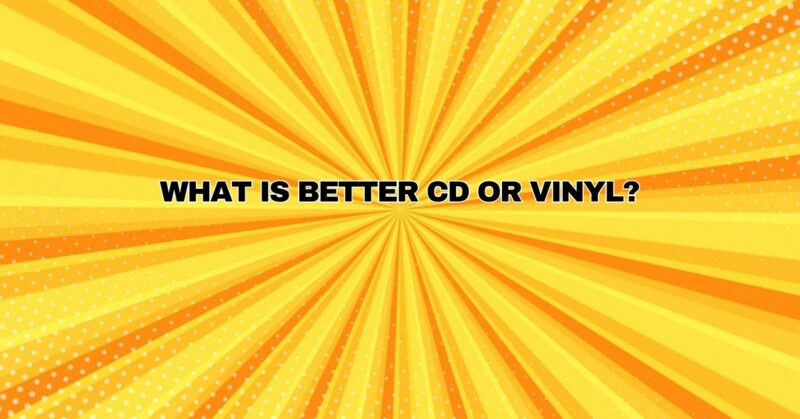The ongoing debate between CD (Compact Disc) and vinyl enthusiasts has been a cornerstone of the audiophile world for decades. Both formats offer unique listening experiences and possess their own sets of advantages and drawbacks. In this article, we will delve into the CD vs. vinyl debate, exploring the characteristics, sound quality, collectability, and practical considerations associated with each format, aiming to help audiophiles make informed choices.
CDs: The Digital Revolution
Compact Discs, introduced in the early 1980s, marked a pivotal moment in the history of audio technology. Here are some key attributes of CDs:
- Digital Sound: CDs store music digitally, using a process called pulse-code modulation (PCM) to capture and reproduce audio. This results in a consistent, high-quality sound free from the analog imperfections found in vinyl records.
- Clarity and Accuracy: CDs offer exceptional clarity, accuracy, and low noise levels. The absence of surface noise and pops and clicks, common in vinyl, provides a pristine listening experience.
- Durability: CDs are physically robust and resistant to environmental factors like dust and humidity. They are less prone to wear and tear than vinyl records.
- Convenience: CDs are compact, lightweight, and easy to transport. They are also readily playable on a wide range of devices, including CD players, computers, and modern gaming consoles.
Vinyl Records: Analog Warmth and Tradition
Vinyl records have been a cherished medium for music enthusiasts since their inception. Here are some key attributes of vinyl records:
- Analog Warmth: Vinyl records are celebrated for their analog warmth, characterized by subtle imperfections such as pops, crackles, and surface noise. Some audiophiles find these imperfections contribute to a more authentic and emotionally engaging listening experience.
- Sound Quality: While vinyl records may not achieve the same level of sonic accuracy as CDs, they offer a unique and pleasing sonic character. The analog format can impart a warm, organic, and dynamic sound that some listeners prefer.
- Album Art and Packaging: Vinyl records feature larger album artwork and often include additional materials like lyric sheets and posters, enhancing the overall aesthetic and tactile experience.
- Collectibility: Vinyl records have garnered a dedicated collector’s market. Limited editions, rare pressings, and vintage records can become valuable collectibles over time.
- Ritual and Engagement: Playing vinyl records involves a ritualistic and hands-on process, from carefully handling the record to placing it on the turntable and manually lowering the stylus. This level of engagement appeals to many vinyl enthusiasts.
CD vs. Vinyl: A Matter of Preference
The choice between CD and vinyl ultimately boils down to personal preference. Here are some factors to consider:
- Sound Quality: If you prioritize pristine audio quality, CDs are likely the better choice. They offer high fidelity, accuracy, and consistency. However, if you value analog warmth and the tactile experience of vinyl, records may be your preference.
- Collectibility: Vinyl records have a strong collectible aspect, with rare and vintage records often appreciating in value. CD collections are less likely to hold the same level of collectible appeal.
- Convenience: CDs are compact, portable, and compatible with modern devices. They are also less susceptible to physical damage and wear. Vinyl records, on the other hand, require careful handling and maintenance.
- Aesthetic and Ritual: Vinyl records offer a unique sensory and ritualistic experience, from the physical act of handling the record to the visual appeal of album artwork. CDs lack this tactile engagement.
- Availability: CD releases are more prevalent for contemporary music, while vinyl is often associated with older or niche genres. Consider the availability of your preferred music in both formats.
Conclusion
The CD vs. vinyl debate ultimately hinges on personal preferences and priorities as an audiophile. CDs offer pristine digital sound quality, convenience, and durability. Vinyl records provide a unique analog warmth, a tactile and engaging experience, and collectible appeal.
For some, the choice may involve a mix of both formats, as each has its own merits. In the end, the beauty of the CD vs. vinyl debate lies in the diversity of listening experiences it offers, catering to audiophiles with different tastes and sensibilities. Whether you favor the precision of digital sound or the analog charm of vinyl, the joy of music remains at the heart of both formats.


